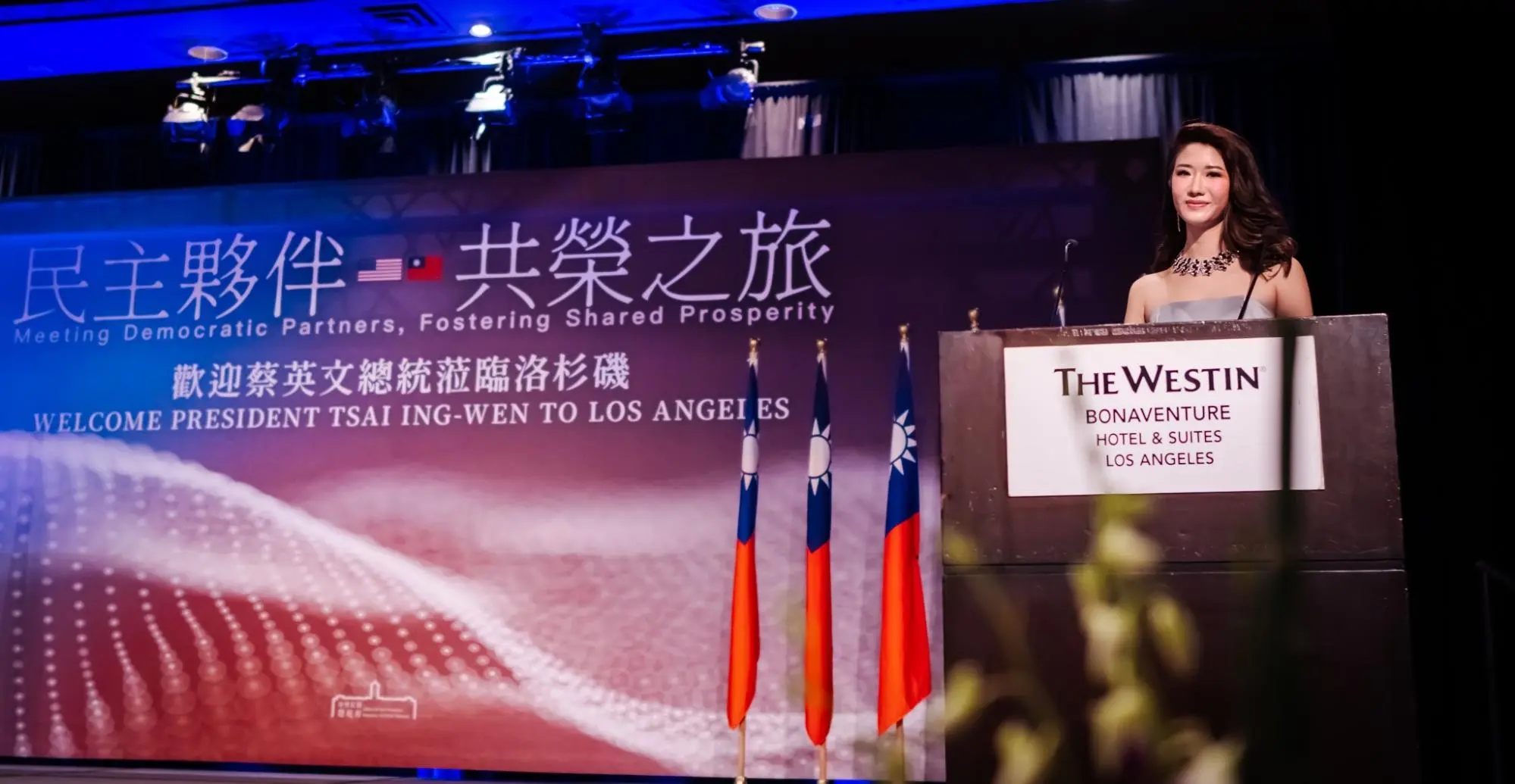On April 5, Stanford student and Taiwanese American pageant queen Tiffany Chang ’26 took part in the “opportunity of a lifetime” — emceeing for a Los Angeles banquet with President Tsai Ing-Wen of Taiwan. Chang welcomed Tsai, the leader of the country from which her family had emigrated 40 years prior, to the city they now call home.
“There were more than, I think, 800 Taiwanese Americans there that day,” Chang said of the banquet, which was organized in part by Taiwan’s Overseas Community Affairs Council. “And the atmosphere was unlike anything else I’ve ever experienced.”
Chang delivered opening remarks and introduced key speakers at the banquet. She said she was moved by the support her community expressed for Tsai. According to Chang, cries of “Long live Taiwan” echoed through the room as speeches about U.S.-Taiwan partnership were delivered in both English and Mandarin.
Tsai’s Los Angeles visit was a stopover after her diplomatic trip to Latin America, which was themed around “Meeting Democratic Partners, Fostering Shared Prosperity.” The itinerary for her first overseas trip in three years also included meetings with bipartisan Congressional leaders led by House Speaker Kevin McCarthy (R-CA). During her remarks at the banquet, Tsai expressed hope for continued cooperation between the United States and Taiwan.
Beijing claims that Taiwan is a Chinese territory, and the United States does not officially recognize Taiwan as an independent nation. According to Oriana Mastro, scholar of U.S.-China relations and Center Fellow at the Freeman Spogli Institute for International Studies, this is largely due to the “heightened risk of invasion” that China poses to Taiwan. Mastro says U.S. leaders fear that American support for Taiwanese sovereignty could trigger a military conflict with China that Taiwan stands no chance of winning.
Despite the lack of support for independence from the U.S. government, the Taiwanese American community continues to organize. For Chang, one of the most powerful aspects of last Wednesday’s banquet was the sense of cultural pride she felt alongside her community.
“I feel like we all have a shared sense of Taiwan pride, and we feel like it’s like our responsibility to sort of build this bridge between Taiwan and the United States,” she said.
From pageantry to presidential banquet
Tsai’s visit was not Chang’s first experience as a representative within the Taiwanese American community. Last August, Chang was crowned winner of the Miss Taiwanese American (MTA) Pageant, which is how she learned about the opportunity to emcee for last Wednesday’s banquet and decided to apply for the role.
Considered by some as shallow and demeaning towards women, beauty pageants are not typically associated with the kind of community work Chang does. Chang said that she initially shared this skepticism towards pageantry, but ultimately competed in MTA — which seeks to “cultivate young leaders, foster Taiwanese identity, and encourage community service” — in order to learn more about her heritage.
What Chang experienced over the course of the pageant was the complete opposite of her expectations, and a moving celebration of Taiwanese culture.
“Rather than tearing apart who I am, I feel like [the pageant] reinforced my identity and sort of gave me a voice,” Chang said. She noted that competing in MTA provided her with public speaking and volunteering opportunities that helped prepare her for her role at the banquet.
The program also left her with a lasting sense of purpose to celebrate her “unique” Taiwanese-American identity and build a network “not only with other Taiwanese Americans, but other Asian Pacific Islanders to achieve a greater sense of citizenship as a whole.”
However, challenges to Taiwanese identity in the U.S. still exist today. Before attending Tsai’s banquet in Los Angeles, Chang encountered protestors against Taiwanese statehood outside the venue. She felt the experience was a grim reminder of Taiwan’s ongoing geopolitical tensions.
Cross-country celebrations with Taiwanese Americans
In keeping with tradition from previous overseas trips, Tsai visited two major U.S. cities en route to Latin America to celebrate Taiwanese expatriates. Just one week before visiting Los Angeles, Tsai stopped for another banquet in New York City. Emma Su ’25, financial officer for Stanford’s Taiwanese Cultural Society, was in the audience.
“It was really amazing to see a number of Taiwanese American students, like myself, in the audience to show their support for President Tsai,” Su said. She was also excited to see the governor of her home state speak at the event.
Su described New Jersey Governor Phil Murphy as “very intentional” in his remarks encouraging greater ties with Taiwan, indicative of support for Taiwan from many subnational U.S. leaders.
The future of U.S.-Taiwan relations
According to Mastro, events like Tsai’s stopover visits to American cities are not unusual. The fact that Tsai visited the U.S. rather than American leaders entering Taiwan “can even be seen as a win for China,” she said. McCarthy has expressed intentions to visit Taiwan before, though he does not have any current plans to do so.
Nevertheless, Mastro agreed that there is still hope for deeper ties between Taiwanese and American leaders in the coming years. Mastro, who visited Taiwan last August, said that the two nations would need to solve disagreements over COVID policies and military cooperation before they can build a relationship.
“I think the will is there in the United States,” Mastro said, referring to American policymakers, “For people in the United States, the big question is, how willing is Taiwan?”
